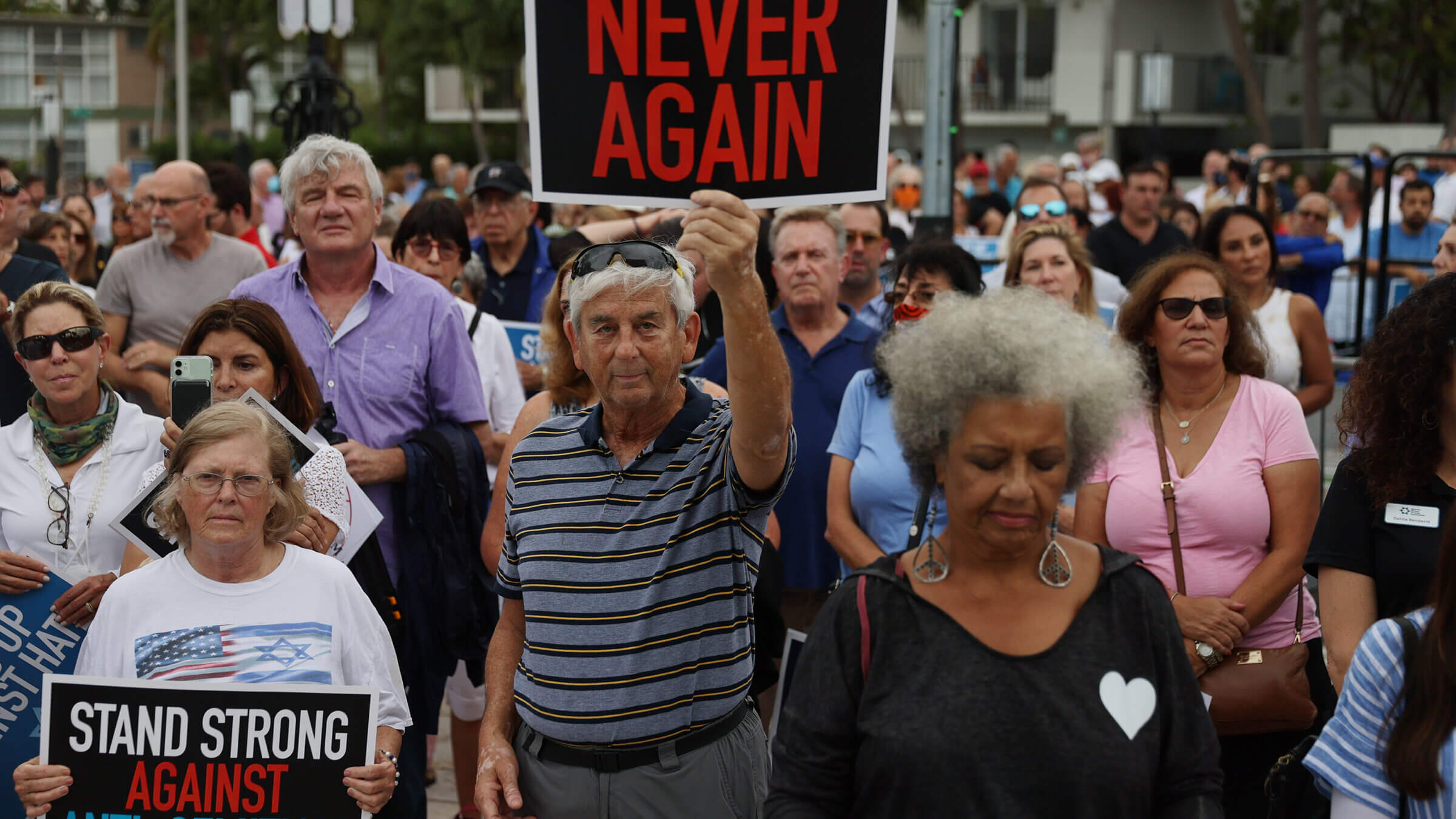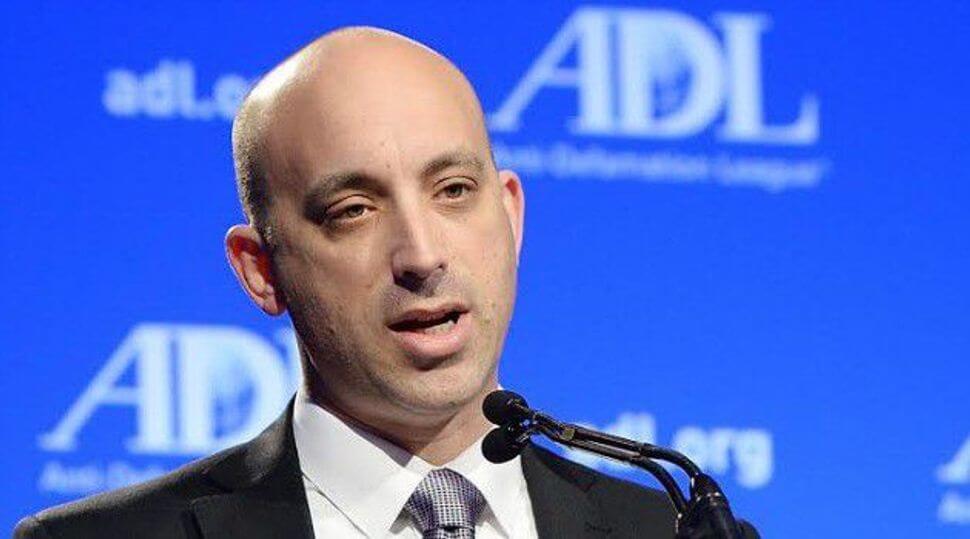1 in 5 Americans think Jews ‘have too much power,’ new ADL survey finds
Majority of Americans agree Jews ‘stick together,’ and seek to hire other Jews

An interfaith rally against antisemitism in Miami in 2021. A new survey from the Anti-Defamation League found that a large share of Americans believe a variety of antisemitic tropes. Photo by Getty Images
A majority of Americans believe it is at least partly true that Jews “stick together more than other Americans,” and seek to hire other Jews, a new survey from the Anti-Defamation League found. At the same time, 39% think Jews are more loyal to Israel than the United States, and 20% say that Jews “have too much power” in the United States.
And adults 30 and under reported almost the same share of antisemitic beliefs as older Americans, an indication that the prejudice may not fade with age as was previously believed.
The findings come at a time when concern over antisemitism is rising among American Jews, and several celebrities have sparked controversies related to antisemitism. The American Jewish Committee released its own data Thursday showing that 47% of American Jews felt less safe following the Colleyville synagogue hostage crisis last January.
According to the ADL, the share of Americans who reported a belief in the most negative stereotypes about Jews was relatively low, including 16% who believed it was at least “somewhat” true Jews were less honest than other businesspeople, 17% who believed they were “not warm and friendly” and 19% who said Jews “have a lot of irritating faults.”
“Those of us on the front lines have expected such results for a while now — and yet the data are still stunning and sobering: there is an alarming increase in antisemitic views and hatred across nearly every metric — at levels unseen for decades,” Jonathan Greenblatt, the ADL’s director, said in a statement.
But comparing the survey to similar past surveys, it’s unclear whether that conclusion — that the new data reveal a dramatic increase in antisemitic attitudes — can be supported.
Questions over trend
Greenblatt pointed to the election of Donald Trump as president in 2016, and poorly moderated social media networks, as contributing factors to the rise in hatred. The findings also track with an overall increase in prejudice toward other minority groups, including Blacks, Asians, Muslims and LGBTQ individuals, but it is hard to determine the accuracy of Greenblatt’s claim that the data represents an increase in these beliefs among Americans.
In its report, the ADL compared the percentage of survey respondents who agreed with 11 antisemitic tropes to four previous surveys conducted by the organization, most recently in 2019. However, in past years the ADL simply asked whether people “agreed” or “disagreed” with the statements. This year, for the first time, it asked respondents how much they agreed with each statement — combining those who thought an antisemitic trope was “slightly” or “somewhat” true with those who fully agreed.
That new methodology makes it impossible to directly compare answers from this most recent survey to those from prior years because it is not clear how responses in 2019, 1992, 1981 or 1964 would have changed if people had been asked how much they agreed or disagreed with antisemitic tropes, as opposed to the binary choice of agreeing or disagreeing.

Characterizing the trend in a tweet, the ADL concluded that “belief in antisemitic conspiracy theories and tropes nearly doubled since 2019.” The organization highlighted in its publicity materials that 20% of Americans now reported believing six or more antisemitic tropes, compared to 11% in 2019.
But Matt Williams, the director of the ADL’s research center, who oversaw the survey, said that the upward trend was likely less dramatic, because of changes in how questions were asked and who was polled.
“We’re fairly confident what we’re seeing is a trend,” Williams said at a press conference Thursday. But “probably not as wide as the 11% to 20%.”
Williams said the goal of this survey was to gather as much accurate data as possible about antisemitic attitudes in the United States, even if that made it harder to identify trends over time.
This is the second time in recent years that the ADL has changed its methodology in a manner that appeared almost certain to increase a measure of antisemitism. In 2021, its annual count of antisemitic incidents showed a 34% increase from the previous year. But that jump included nearly 500 reports from new partners, including Hillel, that had not been included in the past.
Williams added that people may feel more free to express offensive beliefs today. That could mean that part of the apparent increase from past surveys might be from respondents who always believed antisemitic tropes, but have been emboldened to admit it by the uptick in coarse political discourse and antisemitic incidents.
“People are willing to be far more honest about biases, prejudices and their hatred than they were 30 years ago,” he said.
Beliefs about Israel
The survey also asked whether respondents agree with a wide range of negative beliefs about Israel — including that it was “not a technology leader,” and “not a strong U.S. ally” — that Greenblatt said all qualified as examples of antisemitism.
“These are beliefs that go far beyond commentary on the Israeli government,” he said. “They are antisemitism.”
It found that while 90% of Americans believe Israel has “a right to defend itself against those who want to destroy it,” 18% were not comfortable spending time with “people who openly support Israel.” And 40% of respondents “at least slightly agree” that Israel treats Palestinians like the Nazis treated the Jews.
The survey was conducted by NORC at the University of Chicago, an independent research institution, which polled a representative sample of 4,000 individuals during September and October of last year. Its margin of error is plus or minus 2%. The ADL said it plans to release the full data set in the coming months, along with additional reports with other notable findings.
Correction: An earlier version of this article misstated in one place a comment from Matt Williams. He said that people may feel more free to express offensive beliefs today, not that they may not feel more free to express offensive beliefs today.















